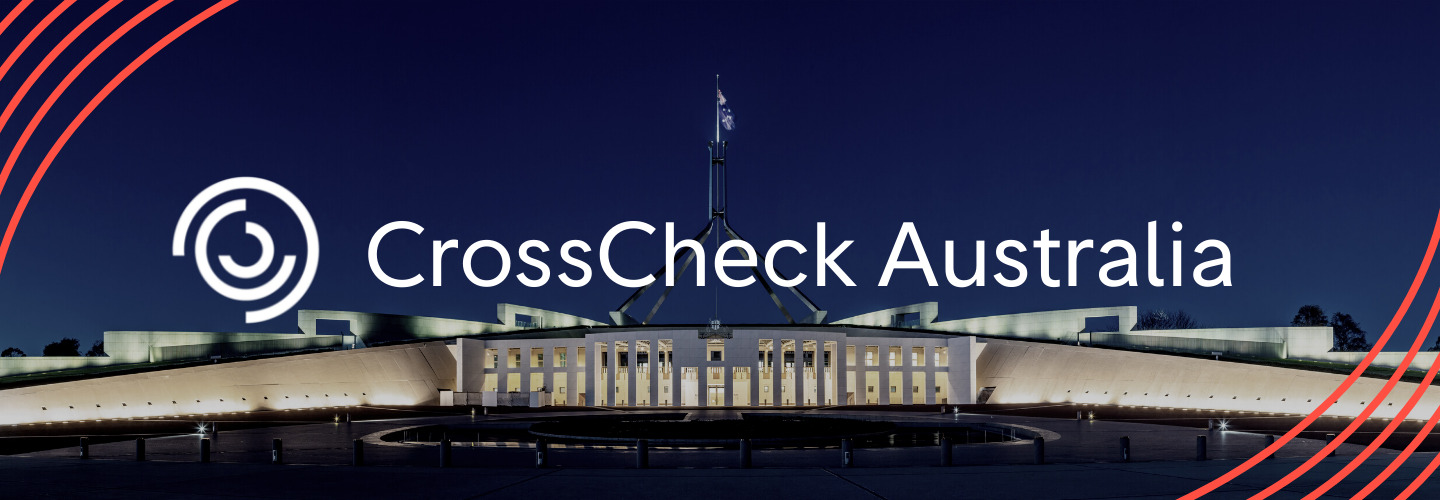
CrossCheck Australia: election watch draws together a diverse range of news media, including national and regional mastheads as well as television and community media. It has a focus on supporting those targeted by mis – and disinformation. The result…much more nuanced, accurate and inclusive reporting to fill the search results.
We are thrilled to have gathered and trained over 110 journalists and media practitioners from the Asian Australian Alliance, Community Radio stations such as 3CR focused on under represented groups, as well as Australian Community Media’s regional titles and political correspondents; other independent brands such as Crikey and mainstream national metro news organisations from the ABC to The Guardian Australia.
The overwhelming majority of journalists surveyed by the Australian bureau of First Draft News during the pandemic said they wanted ongoing support and training, rather than just ‘one off’ events. We therefore devised a 4-week series of master classes and simulations, to be delivered bespoke to each news and community organisation. But importantly, we don’t stop there. In line with our survey findings, we offer focused ongoing support and online monitoring information in our Slack channel.
As of December 2021, a total of 20 training sessions and two Simulations were delivered to 110 participants across 19 different newsroom mastheads and media organisations. These participants are then leveraged as leaders in this field throughout their newsrooms.
The ‘engine room’ is in full swing, providing daily alerts including support and guidance notes which have been quoted by the news organisations in their own reports.
The daily alerts guide journalists through breaking news and ‘on our radar’ narratives. This may include quotes directly attributable to First Draft as well as on background information (cautioning about amplification concerns) and developing reporting strategies where necessary.
In March 2022 we are set to host extra sessions to new joiners and cadets employed by the organisations, as well as election specific simulations.
As we wrap up our Australian election monitoring, a word of thanks to some special people. Our pre-election research was energised by four dedicated, paid interns (funded by Meta Australia) from UTS journalism and law. They juggled their ongoing studies and assignments with navigating the nuances of online discourse. A major part of their duties was to systematically analyse the Meta Ad Library for political ads. Read on for what they learned about information disorder and what it means to their journalism practice:
Daniel Lo Surdo (Bachelor of Communication (Journalism and Strategic Communication), Faculty of Arts and Social Sciences, ’22)
Contributing to the CrossCheck election project helped me to evaluate and assess problematic trends and patterns in the Australian political sphere, which helped me to identify and report misinformation. I would recommend any journalist or editor to engage in a fact-checking exercise such as the CrossCheck election project, as I found it to deepen my understanding of misleading discussion and to synthesise information in a stronger manner.
Lisa Edser (Master of Advanced Journalism, Faculty of Arts and Social Sciences, ’22)
I was expecting blatant mis- and disinformation, and although there was, I was shocked at how prolific more subtle forms of mis and disinformation were presented.
For me, the standout ‘subtle’ tactic was the ‘just asking’ rhetoric, which all political parties seemed to use. This ‘seed planting’ within the Australian public, was a clever way to infer a lie, a bad policy or used to discredit someone’s character — without saying it.
Maryam Mahvash (Bachelor of Communication (Digital and Social Media); Bachelor of Laws, Faculty of Arts and Social Sciences and Faculty of Law, ’24)
Through my time here, I’ve gained incredible insights into the inner workings of Information Disorder and its detrimental real-world impacts. The role of the traditional media in driving but also countering misinformation became evident.
I’ve also learnt to empathise with people who are vehemently dismissed as conspiracy theorists. Having spent many hours in unfamiliar, highly conservative & niche echo chambers — I’ve learnt how misinformation manipulates thinking. Through excessive exposure to propaganda, these ‘theorists’ began to wrongly equate familiarity with rationalisation. I found that individuals flock to conspiracies seeking community and comfort and that alienating them is counterintuitive to the purpose of fact-checking in upholding social cohesion.
Krutika Kale (Master of Advanced Journalism (Extension), Faculty of Arts and Social Sciences, ’23)
We monitored Facebook, TikTok, Twitter, and other platforms to keep tabs on each candidate and their agenda and found many trying to influence the general public very subtly. Use of clever tactics to dishonour other candidates, linking candidates to people from highly influential countries like China, Chinese interference in Australian politics, etc. were quite common trends.
I learnt how to find ways to get to narratives going on in the social media ecosystem by using various keyword searches, looking at multiple platforms at the same time, archiving quickly so that the piece can be traced back if deleted and most importantly doubting each piece and reading through it thoroughly.